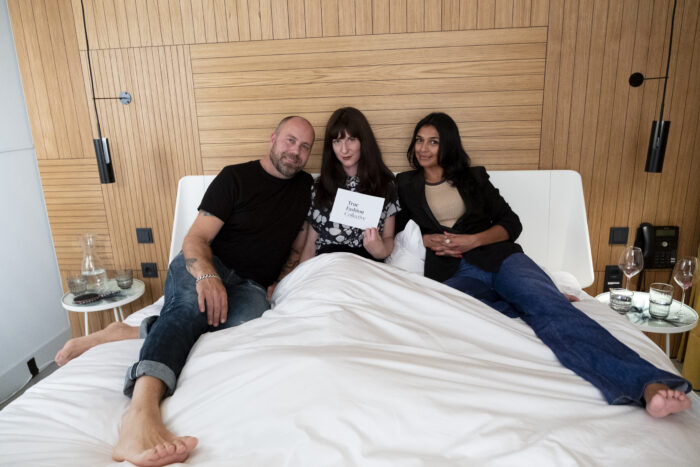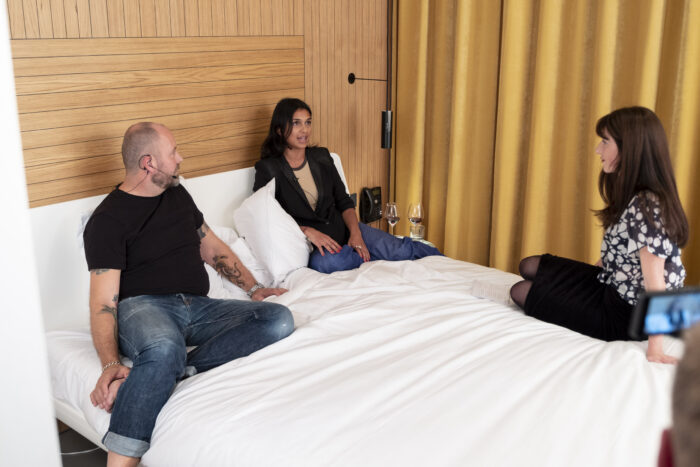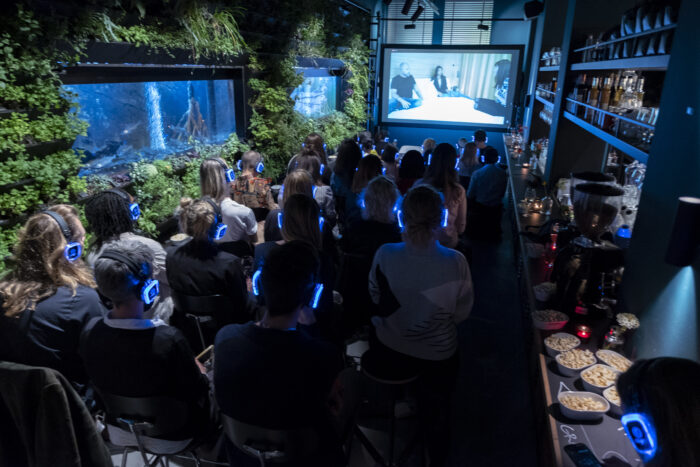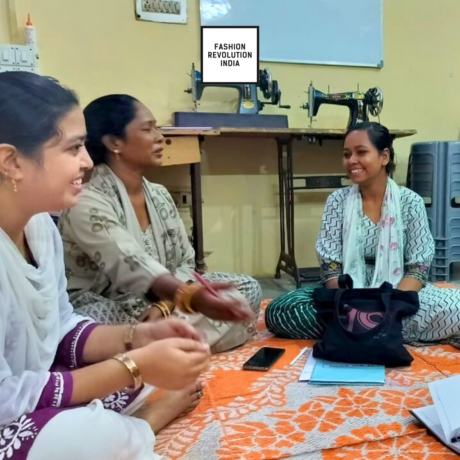Sustainable Fashion Heavyweights Dive Under The Sheets To Champion Transparency
Almost 50 years ago in Amsterdam John Lennon and Yoko Ono held a press conference in bed to draw attention to world peace.
A unique, and playful way to raise global attention to an important issue, this format was used during Dutch Sustainable Fashion Week, by the True Fashion Collective, who prompted an intimate conversation with industry heavyweights on how to improve a dirty industry.
Tony Tonnaer, Founder of denim brand Kings of Indigo and Ciara Shah, Founder of ethical fashion concept Verse, jumped into bed in an ‘unguarded’ setting to reflect on the industry’s current state of play.
Moderated by Lucy von Sturmer from The Humblebrag, this event was was not only broadcast via facebook, but viewed live by more than 40 participants at the Conscious Hotel Bar: Bar Kantoor.

Sustainability = Responsibility
Drawing on nearly two decades of working in the denim industry, Tony defined sustainability as taking responsibility. He said: “In fashion this means taking into account where a product is made, how it is made, and by who.” Underscoring why transparency is a key step towards this, he said:
“As an industry, we produce clothes very far away, but consumers need to be able to trust the claims made by brands. This is where authentication from third-parties and certification is also important.”
Taking Sustainable Fashion from Niche to Norm
Ciara, who worked for more than 10 years for major brands such as Tommy Hilfiger and Calvin Klein, emphasized that she is committed to bringing ‘sassy’ storytelling techniques used at major brands to educate consumers about the importance of sustainability. She said:
“It’s important to communicate these messages in an educational yet enticing way.”
She outlined that her approach is to say the message once, and say it again.
“Even if you’re annoying people who already know the benefits of organic cotton, I believe in telling this message over and over. We aim to inspire rather than judge. And to always tell a compelling story in an inspiring way.”

The Power of Social Media
Both Tony and Ciara highlighted that today, the internet is a key driver of change. “The younger generation want to make more responsible purchasing decisions, and they’re using the internet to find out more about the brands they support.”
What have brands got to hide? Why don’t we see transparent supply chains yet? And why are we still asking, even after the fateful Rana Plaza collapse in 2013 #whomademyclothes?
It’s a mix of anti-competitiveness and the fear that ‘being transparent’ may uncover an issue a brand doesn’t yet know how to resolve. As both speakers highlighted, it’s no longer possible to hide behind dirty secrets. In 2018, we live in an era when secrets can be unravelled with just a few lines of code or clicks.
Ciara called on consumers to use social media to ask brands directly about products. She said: “I send direct messages all the time on Instagram and I often get to talk directly with the owner.”
Cleaning Up a Dirty Industry
Tony’s message was simple “we should take care of this world in a better way.” He outlined how Kings of Indigo (K.O.I) is working to combat the fact that denim is often referred to as a “dirty business.”
As confirmed by the World Bank, 20% of water pollution globally is caused by textile processing. However, through global efforts such as the ZDHC Programme, improvements are being made. As Tony said: “You now see mills with recycling systems that turn textile waste into almost drinkable water again.”
Tony stressed that the ultimate goal of Kings of Indigo is to use only recycled fabric. He said that avoiding conventional cotton, which needs excessive amounts of water, pesticides and fertilizers is also key.
Governments Need to Do More
With a message not just to consumers, but policy-makers too, Tony highlighted how the government can play a role in driving change forward.
“The Netherlands has already done a great job with electric cars by lowering tax rates. They should charge 6% VAT on organic denim and 21% tax on non organic denim.”
With the number of “conscious consumers” rising, both pointed to the issue of greenwashing as a major concern. “You have to be careful about big brands making tiny steps to improve their products, and using these actions as part of their marketing campaigns.” They outlined that claims to ‘do good’ need to be backed by bigger, long-term commitments on the ground.
Stay Skeptical of Greenwash
Tony said: “On the one hand, this trend shows that brands are wanting to improve their products and supply chains, but I encourage people to remain skeptical; do research and ask questions. Hold brands accountable.”
“There’s a lot of talk — now’s the time to actually do something.”

Take Action!
So what can consumers do today?
- Reduce Consumption! Buy less. Compared to 15 years ago, we’re buying 60% more clothing and we keep it for half as long. On average, 1 in 3 garments is never worn.
- Buy better. Form an emotional connection with your clothes, and buy quality. Buy only what you need and love what you buy!
- Choose natural fibers. Natural fibres biodegrade better, and are better for your body. That’s cotton, linen, wool, silk, hemp, or cashmere. Synthetic fabrics, or “plastic fabric” include polyester, rayon, modal, spandex and nylon.
- Support local brands because it not only reduces your carbon footprint, but it’s always good to support the little guy!
- Finally, be ‘conscious.’ This is to say: engage with brands; ask questions and do research.
Here are a few resources to guide you on your way:
- Rank A Brand: https://rankabrand.org/ ~ ranks brands based on climate impact, environmental impact, labour conditions and transparency.
- Good On You: https://goodonyou.eco/app/ ~ a mobile app that includes brand ratings, information, offers and news about ethical and sustainable fashion.
- Fashion Revolution ~ https://www.fashionrevolution.org/ ~ a worldwide movement that celebrates fashion as a positive influence while also scrutinizing industry practices and raising awareness of the fashion industry’s most pressing issues. Join their campaign #whomademyclothes each April.








